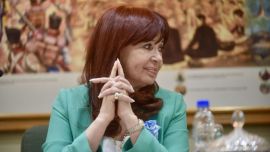With Palm Sunday tomorrow marking the start of Easter Week, a timely theme for this week’s editorial might be redemption. Not in the sense of seeing the coronavirus pandemic as any divine vengeance, or even as a punishment for all the environmental sins leading to climate change, as some claim – this would be mixing apples and oranges since previous generations of history with ample respect for nature suffered far worse plagues, which could also be seen as Tennyson’s “Nature red in tooth and claw.” The pandemic should not prevent us from staying worried about climate change but they are two different sets of problems. Instead the notion of redemption arises from the idea that all the harm arising from this pandemic also creates far more scope for doing good, as illustrated by some examples from last week’s news in Argentina.
One candidate for redemption could be the teamster Hugo Moyano, the recipient of lavish praise on Wednesday from President Alberto Fernández. A trade unionist being glorified by a Peronist president would not normally be either surprising or proof of merit but Moyano is an extreme case – a track record making him a worthy local reincarnation of Jimmy Hoffa and a string of courtroom cases for financial irregularities which cannot lightly be dismissed as “lawfare.” But give the man a chance – he has just opened his union’s Sanatorio Antártida hospital at his own expense and donated the use of its 200 beds to the health system to fight the pandemic. A cynic might point out that the hospital had stood idle until now because it was denied both staff and patients by Moyano’s feud with other unions, but this week at least he has put the right foot forward, potentially giving himself the chance to make last Wednesday the first day of the rest of his life. At a less idealistic level, President Fernández has been criticised for praising so shady a character as Moyano but in reality he has little choice – in an economy which runs on wheels, with trucks delivering food to neighbourhoods rich and poor, supplying the hospitals, filling up the ATMs and removing the garbage, he can ill afford to antagonise their union chief.
An even clearer case of redemption is the transformation in the public image of the “pickets,” as the social organisations have been generally dubbed by most media. Whatever the legitimacy of their demands, their most visible face of late has been blocking downtown roads to the intense frustration of countless commuters. Today this is a fading memory with the roads emptied by lockdown. Instead the image of idle extortionists has been transformed into useful and untiring citizens, who are busy sewing face-masks, producing alcohol-based hand gel and assembling beds in carpentry workshops despite their humble means, while their less manually skilled members spread awareness of the coronavirus dangers – ordinary people doing extraordinary things. Before the emergency, these organisations had been running community canteens, as well as blocking roads, but today we can only see the good they do – this crisis has presented the “pickets” with an opportunity to place themselves on a different footing with the rest of society.
At the other end of the social scale there is also a chance of redemption but this is more complex. President Fernández placed big business directly in the firing-line last weekend when he rapped multinational Techint tycoon Paolo Rocca over terminating almost 1,500 job contracts. When Fernández told the business community that having made billions in the past, they could earn a bit less now, he was right in the first half of that affirmation and wrong in the second half. Businessmen have indeed earned billions in the past (far too much of which has found its way abroad), not only under the previous pro-market presidency but during populist regimes as well. But when a business is closed down with zero income yet still has to pay wages, taxes, insurance, etc., it is not making less money, it is losing it. An intractable problem which cannot be ignored or underestimated, even if some can swallow the pain more easily than others. If we move from the corporate to the individual level, we can still appeal to the affluent to redeem themselves with sacrifices – an appeal definitely not excluding the political classes but not limited to them either.
Perhaps everything will revert to type after the crisis is over – many people vowed never to fly after the 9/11 attacks in 2001, for example, only for air travel to become a prime factor in this pandemic – but this Easter might just give humanity a new resurrection.


















Comments